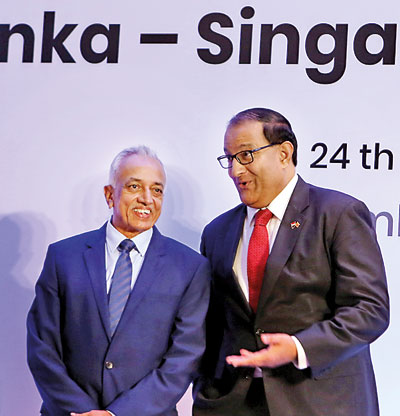SL-S’pore FTA to open trade to the East Asian region
Sri Lanka and Singapore’s free trade agreement (FTA) signed during a visit by Singapore Prime Minister Lee Hsien Loong to Colombo is part of the broader strategy of eyeing the East Asian region and plugging into Asian supply chains, top state officials say.

The two ministers in conversation
Malik Samarawickrama, Minister of Development Strategies and International Trade in his address at the Sri Lanka- Singapore Business forum in Colombo on Wednesday said that this FTA comes at a time when trade with Sri Lanka is growing, with bilateral trade reaching US$ 2.7 billion last year.
“This is a lynchpin in the ongoing policy reforms,” he said. The negotiations of the Sri Lanka-Singapore Free Trade Agreement (SLSFTA) commenced in August 2016 after signing of the joint statement of Singapore and Sri Lanka, during the official visit of Sri Lanka’s Prime Minister to Singapore on July 18-19, 2016. Eight rounds of negotiations have been completed and as a result, the agreement has come to the final stage in January 2018.
Singapore is Sri Lanka’s seventh-largest foreign investor.
Sri Lanka has many pluses such as excellent location and ports, a modernised Customs Department and the One Stop Shop at the Central Customs Clearance Unit, Mr. Samarawickrama noted saying that now a more comprehensive system of trade agreements is required.
Following the signing of the SLSFTA, three Singapore companies sealed deals with Sri Lankan partners. To capture opportunities in this growing market, Food Studio1, Ark Holdings and HPL Hotels & Resorts signed four agreements for new projects across food, aquaculture, hospitality and infrastructure.
The forum was organised by International Enterprise (IE) Singapore, Singapore Business Federation (SBF), Ceylon Chamber of Commerce and Sri Lanka Singapore Business Council. Mr. Samarawickrama and Singapore Minister for Trade and Industry (Industry) S. Iswaran, who was in Sri Lanka, witnessed the signing.
Mr. Iswaran addressing the forum said that this FTA was a clear indication of the Sri Lankan Government’s determination to connect with global markets to ensure growth for local business and its people.
When the FTA is in force, he said that Sri Lankan importers will be able to benefit as custom duties are reduced in phases over the next few years for goods imported from Singapore. “This would also benefit Sri Lankan consumers, increasing the variety and affordability of high quality products. The Trade-in-Services chapter creates more opportunities for our professionals in sectors such as Professional Services, Environmental Services, Construction and Tourism to offer their respective services in each other’s markets. The Government Procurement Chapter offers companies the assurance that international tenders for Government projects will be conducted fairly and transparently, while the Investment Chapter will help attract more investments by providing investors with assurances that their investments will be protected.
Already, we are seeing significant momentum in our bilateral economic ties, from 2016 to 2017, bilateral trade between Sri Lanka and Singapore increased by more than 25 per cent to Rs. 300 billion.” The bilateral trade in Services and Foreign Direct Investments also show an upward trend, he added.
Singapore has invested US$530 million in Sri Lanka and Sri Lankan companies have invested US$120 million in Singapore, making FDI a two way process between the two countries.
Singapore companies that have seen success in Sri Lanka include Prima, which houses Sri Lanka’s largest flour mill; Shang Kwan Group, which developed the iconic World Trade Centre in Colombo and Havelock City, the largest integrated development in Sri Lanka. Others include BreadTalk, Certis Cisco, Charles & Keith, Food Empire, Meinhardt, Surbana Jurong and Woh Hup Construction.


